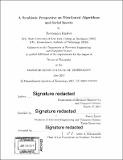A symbiotic perspective on distributed algorithms and social insects
Author(s)
Radeva, Tsvetomira
DownloadFull printable version (12.34Mb)
Other Contributors
Massachusetts Institute of Technology. Department of Electrical Engineering and Computer Science.
Advisor
Nancy Lynch.
Terms of use
Metadata
Show full item recordAbstract
Biological distributed algorithms are decentralized computer algorithms that solve problems related to real biological systems and provide insight into the behavior of actual biological species. The biological systems we consider are social insect colonies, and the problems we study include foraging for food (exploring the colony's surroundings), house hunting (reaching consensus on a new home for the colony), and task allocation (allocating workers to tasks in the colony). The goal is to combine the approaches used in understanding complex distributed and biological systems in order to develop (1) more formal and mathematical insights about the behavior of social insect colonies, and (2) new techniques to design simpler and more robust distributed algorithms. Our results introduce theoretical computer scientists to new metrics, new ways to think about models and lower bounds, and new types of robustness properties of algorithms. Moreover, we provide biologists with new tools and techniques to gain insight and generate hypotheses about real ant colony behavior.
Description
Thesis: Ph. D., Massachusetts Institute of Technology, Department of Electrical Engineering and Computer Science, 2017. Cataloged from PDF version of thesis. Includes bibliographical references (pages 211-219).
Date issued
2017Department
Massachusetts Institute of Technology. Department of Electrical Engineering and Computer SciencePublisher
Massachusetts Institute of Technology
Keywords
Electrical Engineering and Computer Science.